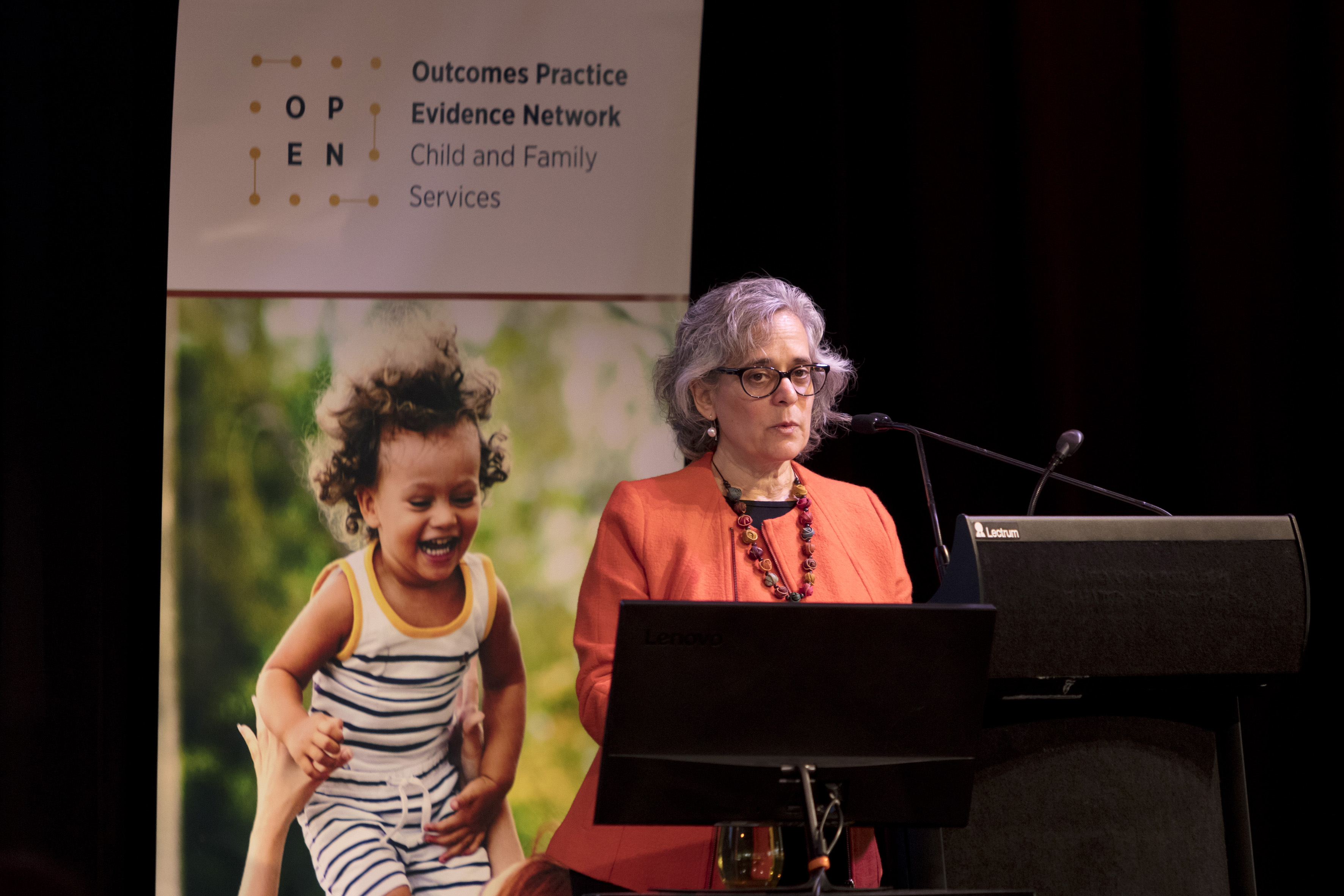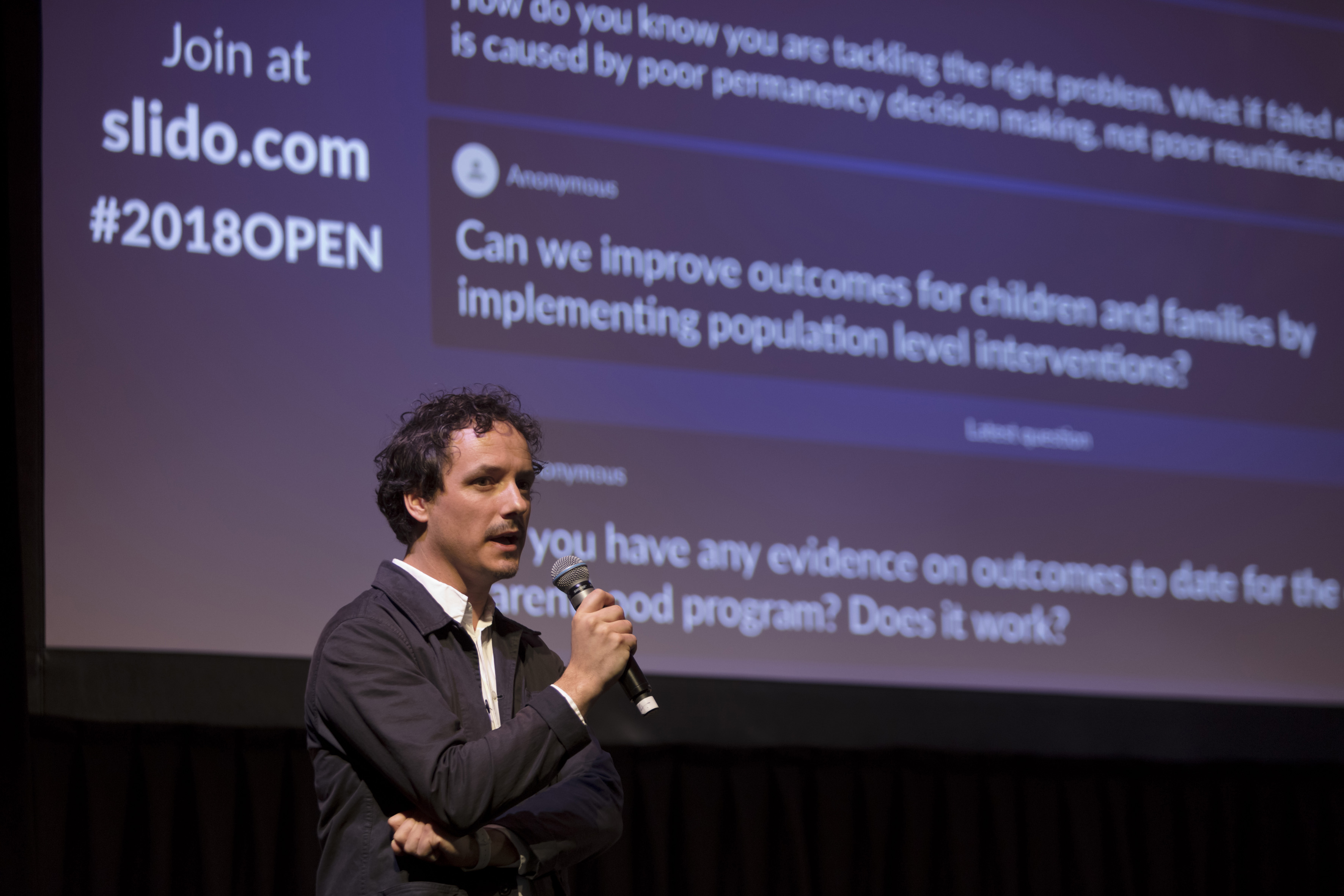Building a compelling evidence-base in Victoria’s child and family services
Participant feedback from the 2108 OPEN Symposium was overwhelmingly positive. In particular, the opening keynote address by Deborah Rubien, Senior Advisor for Evidence-Based Implementation at New York City Administration for Children’s Services (ACS), was warmly received, leaving attendees feeling informed and inspired. A highlight of the day for most, the presentation saw the audience immersed in Deborah’s demonstration of how successful evidence-based programs (EBPs) can be, and the critical importance of implementation support. One attendee commented:
It was amazing to hear how the changes in practice in New York have drastically reduced child protection rates and the interest in these programs locally and at a government level.”
Deborah’s presentation touched on the difference between evidence-based programs and evidence-informed practice, provided a summary of key data showing the scale of the successes achieved, and outlined the challenges and how these were tackled. Deborah reinforced the importance of ongoing coaching for staff and of getting developers to focus on the implementation drivers, emphasising the importance of the long-term commitment of the government to this as a strategic approach to service delivery.

Chris Vanstone, Chief Innovation Officer at The Australian Centre for Study and Innovation (TACSI), delivered a similarly inspiring keynote address exploring the question ‘Will evidence lead us to a brighter future?’ In responding to this question, Chris drew on the work of TACSI, using examples from across Australia, with a particular focus on Victoria. His presentation explored the concept of ‘positive deviance’ and of turning ‘crisis points’ into ‘turning points.’ He highlighted the concepts of families helping other families (peer to peer), of thinking about intergenerational outcomes, working with the whole family and not only the child, and shifting the public narrative about families. This presentation was also a highlight of the symposium with many participants wanting to know more about the innovative approaches to improving practice outlined by Chris.
The afternoon panel, which focused on the question ‘How do we improve and innovate in a connected system?’, also aroused considerable interest. Reflections from the government, mainstream and Aboriginal and Torres Strait Islander service providers on the panel included: the emptiness of reform without underpinning values; the fundamental desire of families to be given hope; the need for ‘permission to fail’; the possibility of substituting the language of ‘outcomes’ with that of ‘social justice’; and the lessons that mainstream organisations can learn from their Aboriginal colleagues, including the concept of deep listening.
Professor Cathy Humphreys provided a succinct and insightful overview of the day and the key themes, including the importance of practice-led research and knowledge building, including coaching, supervision and mentoring, and evidence-embedded ethics.
All presentations on the day were well received, with attendees able to choose from a varied and interesting selection of projects, models and approaches to building better practice. Attendees reported being impressed by the quality of the research presented and the clear links made between practice and research. View the full list of presentations and PDF attachments below.
Many attendees commented on the interesting venue amenities offered by the Arts Centre. The OPEN cookies were a major hit as were the OPEN tote bags. Overall, the 2018 OPEN symposium was judged by participants to be highly successful in its aim of generating informed discussion about how to continue to build a compelling evidence base in Victoria’s child and family services, the importance of continuing to invest in our research and practice capabilities as well as a long-term commitment by government and agencies to proven ways of working.
To view the full day in pictures, visit the Centre’s Facebook.
Symposium Presentations (PDFs):
- Building the Evidence for Participant Co-Design
(Jonathon Cummins, Dr Heather Morris, Anglicare Victoria) - Refining Anglicare Victoria’s Rapid Response Model
(David Giles, Lalitha Nair, Anglicare Victoria) - The NYC Experience: Implementing Evidence-based and Informed Practices
Deborah Rubien, ACS - Evidence-Informed Approaches
(Brigid van Wanrooy, Department of Health and Human Services) - The journey from conception to school: How families navigate through early childhood services in a rural Victorian city
(Carina O’Neill, Dr Donna Ludvigsen, Dr Christina Sadowski, Fed Uni, DET, CHCYAP) - Restorative Approaches to Working with Young People
(Glen McClure, Glenn Jessop, Jesuit Social Services) - Baby’s first yarn: Newborn Behavioural Observations in the first weeks of life in the MDAS Early Years Service
(Mallee District Aboriginal Services) - Children and Mothers in Mind – retrieving the mother-child relationship
(Margaret Kertesz, Lauren Vanderzeil, University of Melbourne, Kids First) - Designing a data-informed continuous practice improvement system in family services
(Warren Cann, Katrina Herbert, Parenting Research Centre, Windermere) - Listening to the experiences of victim-survivors and their children – Evaluation of the TRAK Forward Program
(Dr Deborah Absler, Dr Gaye Mitchell, Karen Piscopo) - Doing It Differently: Insights From Nugel (Belong) – the first Aboriginal children in Aboriginal care
(Lisa Curtis, Sue Anne Hunter VACCA) - VACCA’s Evaluation Framework – Strengthening the evidence base of an ACCO
(Kerry Brogan, Melanie Ashman, VACCA) - Parenting Research Centre Presentation








